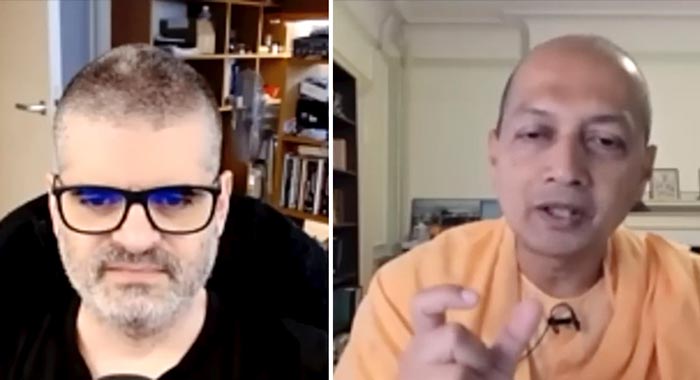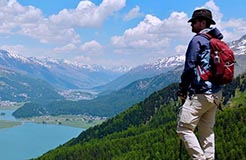News & Views
Introducing… Bernardo Kastrup and Swami Sarvapriyananda: A Dialogue about Consciousness
Charlotte Maberly appreciates a wide-ranging video conversation about Eastern and Western concepts of the self and mind

We might expect a western scientist philosopher and Hindu monk to have conflicting perspectives on the concept of consciousness, but in this fascinating dialogue, Bernardo Kastrup and Swami Sarvapriyananda explore the potential common ground between ancient wisdom and western science.
Bernardo Kastrup is a scientist and philosopher, author of texts such as Why Materialism is Baloney, who describes himself as leading ‘the modern renaissance of metaphysical idealism, the notion that reality is essentially mental’. (See our interview with him below) In the video he confesses to having felt attacked by the scientific community for his conclusions regarding consciousness, which are more closely aligned with the non-dual perspective found in ancient spiritual disciplines.
Swami Sarvapriyananda is a Hindu monk and renowned speaker who is the head of the Vedanta Society of New York [/], a leading proponent of Advaita Vedanta, one of the philosophical schools of Hinduism stemming from the Upanishads. He begins with a beautifully simple explanation of how the Advaita Vedanta discipline has come to understand the self as none other than the pure and singular consciousness that illuminates all objects of experience: ‘Tat tvam asi’, That thou art – Thou art that. Bernardo responds with admiration, saying that:
In less than twenty minutes and with complete clarity [Swami has] just summed up the key to life.
In contrast, by being materially oriented, the Western scientific approach is left with what has been called the ‘hard problem of consciousness’ – the mystery of how the firing of neurons in a material brain produces the first person experience through which we live every moment and every sensory, cognitive and feeling aspect of our lives. Bernardo, however, is willing to question many of the fundamental assumptions which underpin the western perspective, especially the indubitability of matter at the heart of scientific enquiry.
A materialist perspective casts the self as a finite and vulnerable physical body existing for a short time in a vast and seemingly uncaring world. This inevitably shapes what we think is worth doing, how we treat others, and how we treat the world. Swami Sarvapriyananda describes this as a profound misunderstanding of who we are, and part of the story which has ultimately produced a dualistic and damaging culture. He suspects that because it is non-theistic and rational, Vedanta philosophy on self-knowledge can offer an alternative understanding which is accessible to the western mind, as it draws on everyday experience and analyses this rationally.
In his own line of enquiry, Bernardo presents a non-dual understanding of consciousness and has been accused of plagiarising the Upanishads. He has subsequently studied the ancient texts, developing a deep respect for those who had so thoroughly investigated these existential questions thousands of years ago.
Swami acknowledges that his own understanding benefits from having substantial material and an established wisdom to draw upon, while Bernardo “has to take modern science, philosophical thought and his own intuitions seriously” to make this thinking acceptable for the modern age. Swami describes Bernardo’s work as courageous and essential:
This is the important thing – to think and rethink everything for oneself and in one’s own age.
The video is worth watching simply for the extraordinary clarity with which both men articulate a deeply complex concept. But perhaps the most profound point is made by their evident mutual respect for one-another. This is a touching exploration of a vital topic and feels particularly important, even nourishing, in the current context of persistent and divisive rhetoric across so many platforms of expression.
Video: Eastern and Western lenses to Analytic Idealism with Bernardo Kastrup and Swami Sarvapriyananda. Duration: 2 hours. Start at 2:40 if you want to skip the introduction
Charlotte Maberly
read more in beshara magazine
More News & Views
Don’t Take It Easy
Richard Gault is inspired by Michael Easter’s book The Comfort Crisis and explores the idea of ‘misogi’ during a 600-mile walk across Scotland
Book Review: ‘The Serviceberry’
Martha Cass contemplates the message of a new book by Robin Wall Kimmerer that advocates ‘an economy of gifts and abundance’
Book Review: ‘Conversations with Dostoevsky’
Andrew Watson engages with an innovative new book by George Pattison which explores Dostoevsky’s relevance in the contemporary world
Thich Nhat Hanh & the Poetry of Engaged Buddhism
Philip Brown presents the poem ‘Recommendation’ and comments on the potential of contemplative art to foster compassion
Introducing… ‘Perfect Days’ and ‘Nowhere Special’
Jane Clark watches two films with a contemplative theme
Book Review: ‘Irreducible: Consciousness, Life, Computers and Human Nature’
Richard Gault reviews a new book by Federico Faggin, one of the leading lights of the science of consciousness
FOLLOW AND LIKE US
——————————————
——————————————
——————————————
If you enjoyed reading this article
Please leave a comment below.
Please also consider making a donation to support the work of Beshara Magazine. The magazine relies entirely on voluntary support. Donations received through this website go towards editorial expenses, eg. image rights, travel expenses, and website maintenance and development costs.
READERS’ COMMENTS
6 Comments
Submit a Comment
FOLLOW AND LIKE US

The video link seems to be missing. I’d love to wafch this priceless conversation between these two.
Ok for me – playing it now!
I also do not see the video link
Dear Madam,
Thanks for uploading this video.
Swami Sarvapriyansnda was the officiating principal of Belur Ramakrishna Mission Sikshanamandira, ( B.ed College),Belur Math . during 2002-2003 and I was blessed enough to sit at his feet and learn some illuminating lessons of Adwaitya Vedanta.
With regards,
Bibekananda Roy,
W.B., India.
If you put in the title of the talk on Youtube you’ll find it easily. The introduction is rather long, but the dialogue is deep, clear, and very inspiring .
Anytime us humans try to explain the meaning of life or other esoteric things like consciousness we are bound to flounder. And yet, the exercise is a worthy pursuit for our “hearts” may reveal something to our discombobulated minds. };- a.m.